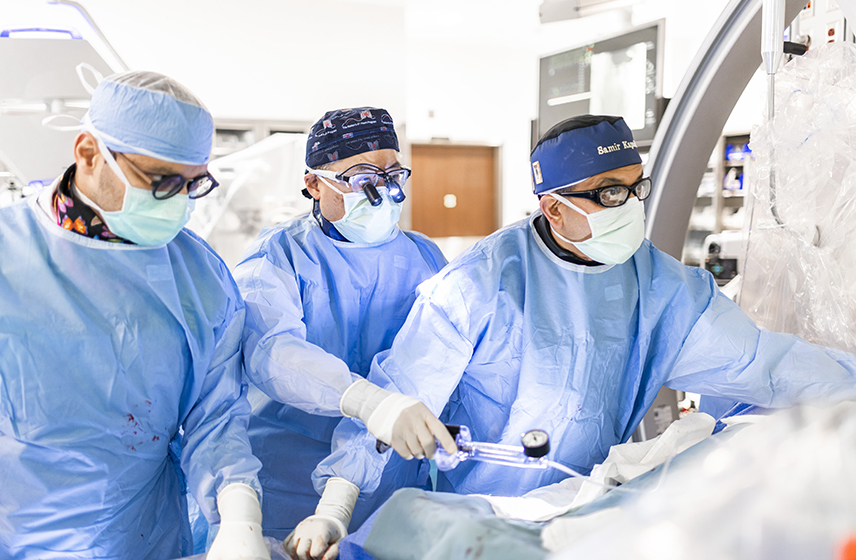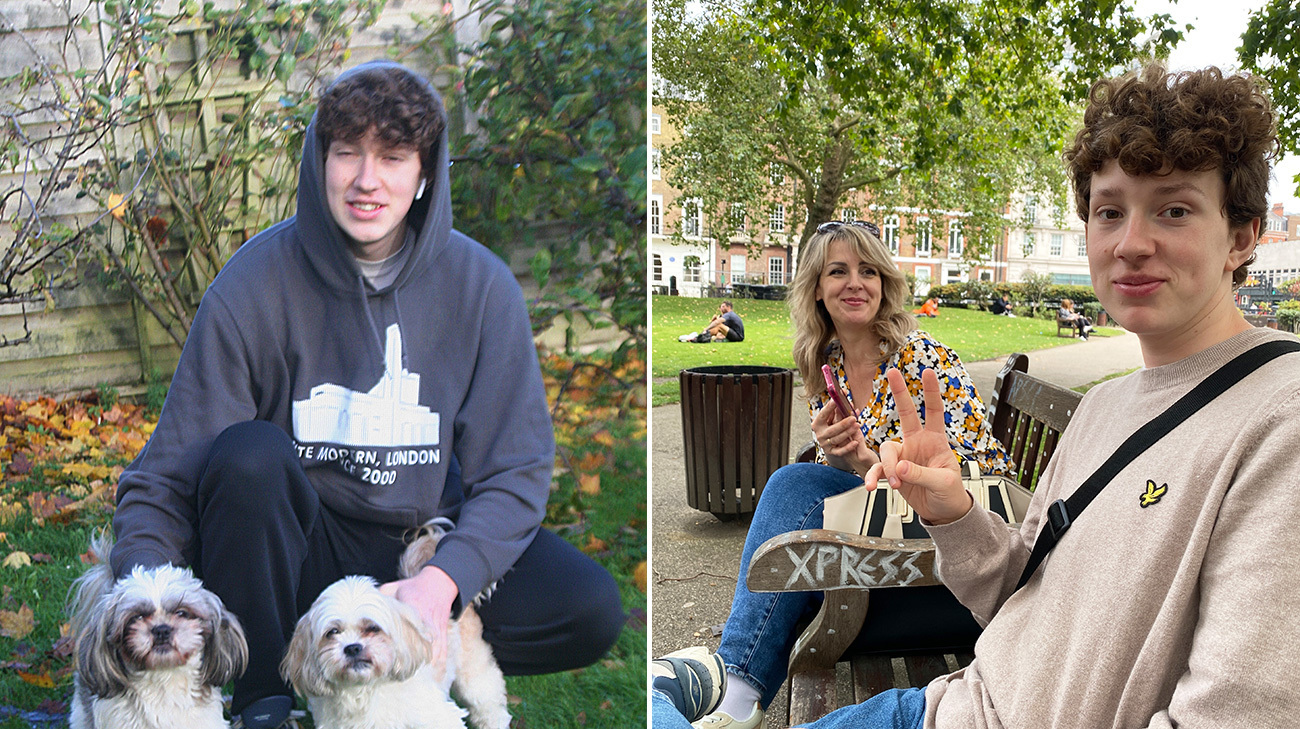
Interventional Cardiology
Not all complex heart conditions require open-heart surgery. Today’s advanced technology makes it possible to combine imaging and minimally invasive surgery to treat coronary artery disease, valve disease and structural heart conditions. These procedures, known as interventional cardiology, result in smaller incisions, less pain and a faster recovery. At Cleveland Clinic London, our internationally recognised heart experts can guide you through your options, offer a thorough evaluation and answer all of your questions about interventional cardiology.
Why Choose Us for Minimally Invasive Cardiology Care?
Specialised knowledge:
Our private cardiologists focus on mitral, tricuspid and aortic valve treatments, including transcatheter aortic valve implantation (TAVI) and transcatheter edge-to-edge repair (TEER). We also treat a broad range of complex coronary and structural problems, including left atrial appendage closure and treatment of chronic total occlusions.
Collaborative care:
At Cleveland Clinic London, we have the heart experts you need. Consultants in cardiology, heart imaging, interventional radiology, electrophysiology and heart surgery work together to build your treatment plan. We can often book appointments with multiple specialists in a single visit to ensure you receive convenient, coordinated care from London’s top heart consultants. Meet our team.
Outcomes:
Keeping you safe and providing quality care is our top priority. We have a 99.8% success rate from transcatheter aortic valve implantation (TAVI), with 95% of patients going home the next day. We also have a 100% success rate with non-valve structural interventions*.
Trusted Experts:
When you need specialised care, you want a team you can trust. We work with you to ensure that you feel comfortable and confident in your treatment. The feedback we receive reflects that trust — nearly all patients (99.2%) say they would recommend our care to friends and family. Just as many (99.4%) would recommend our consultants, and 96% rated their nursing care as exceptional*.
Specialised equipment:
We have three cardiac catheterisation labs and a hybrid operating theatre with the latest imaging, catheterisation and surgery technology. This allows us to provide complex treatments, such as combined open and interventional therapies, in a single procedure. Our advanced tools and techniques help us to not only provide rapid treatment but also offer second opinions when you’re still considering your options.
Innovation and research:
Our experts are often among the first in the U.K. to introduce new interventional cardiology treatments and tools. This includes radial (wrist) access for interventional procedures and next-generation devices for left atrial appendage closure and mitral and tricuspid valve regurgitation.
* Clinical data reported in 2024 to the National Institute for Cardiovascular Outcomes Research. Non-clinical data (including patient recommendations) gathered from the 2024 Cleveland Clinic London Patient Experience Survey.
What Is Interventional Cardiology?
Minimally invasive interventional cardiology gives us a treatment option if open-heart surgery poses too high of a risk for you. We use advanced heart imaging to guide thin, flexible tubes called catheters through a small incision in your thigh or wrist. We move it slowly into your heart’s delicate blood vessels and valves to treat many heart conditions and valve diseases, including:
- Acute coronary syndrome
- Aortic valve stenosis
- Atrial fibrillation
- Atrial and ventricular septal defects
- Chronic total occlusion
- Coronary artery disease
- Heart attack
- Heart failure
- Left ventricular hypertrophy
- Mitral or tricuspid valve regurgitation
- Mitral valve stenosis and prolapse
- Patent foramen ovale
Our team also uses interventional cardiology techniques to assess your heart’s health. They’ll look for things that could increase the risk of heart attacks or strokes, especially if you’ve experienced symptoms like breathlessness or high blood pressure.
Your Interventional Cardiology Evaluation
Our interventional cardiologists monitor and treat even the most complex forms of coronary artery disease, including chronic total occlusion — a complete coronary artery blockage.
When you meet with your consultant, you may have tests to help us confirm a diagnosis and decide if you’re a suitable candidate for interventional treatments.
Diagnostic cardiac catheterisation
Cardiac catheterisation provides detailed information about blood flow and pressure in your heart’s vessels. Our cardiac catheter lab has the latest equipment that allows us to combine minimally invasive, catheter-based tests with noninvasive tests, such as echocardiography. This approach helps us make customised treatment decisions. Your cardiac lab testing may include:
- Fractional flow reserve: Measures blood flow on either side of a coronary artery blockage
- Intravascular ultrasound: Helps us examine plaque buildup on artery walls
- Optical coherence tomography: Creates highly detailed pictures of your arteries
Consultants Who Offer Interventional Cardiology Services
Locations
Our consultants see patients in modern and technologically advanced facilities in the heart of London.Interventional Cardiology Treatments at Cleveland Clinic London
Your interventional cardiology treatment plan will depend on your specific diagnosis and needs. We will explain each option and ensure your questions are answered so you can move forward with confidence.
Percutaneous coronary intervention
This minimally invasive, catheter-based procedure often replaces the need for bypass surgery when you have a fully blocked coronary artery. We use catheters, special guidewires and balloons to widen the artery. We will then place a tube called a stent to keep it open.
Our team may combine percutaneous coronary intervention with another procedure, rotational atherectomy, to break up stubborn blockages called coronary calcifications before using an artery-widening balloon or placing a stent.
Interventions for structural and valve problems
At Cleveland Clinic London, you can receive the latest interventional care for structural conditions in your heart’s walls, chambers or muscles. We also provide interventions for problems with your heart’s valves.
These minimally invasive treatments can help relieve chest pain, breathlessness, palpitations and other symptoms. They can also reduce your risk of a stroke or pulmonary hypertension (increased pressure in your lung’s blood vessels). For structural problems, we may use interventional cardiology to do these procedures:
- Atrial septal defect closure
- Left atrial appendage closure
- Paravalvular leak closure
- Patent foramen ovale closure
Our valvular interventions include:
- Transcatheter aortic valve implantation
- Transcatheter edge-to-edge-repair
Paying for Private Interventional Cardiology Care
Before you start treatment, we will provide you with a personalised estimate that covers every aspect of your treatment plan — with the most accurate pricing possible.
You can use private medical insurance or our self-pay options to cover the cost of your treatment. You can even pay in instalments through our partner, Chrysalis Finance. We make getting expert private care and settling your account as simple as possible.
What’s Next
When you need care for a heart condition, you want a combination of expertise and innovation. At Cleveland Clinic London, we bring together top consultants and minimally invasive treatment options to help you get the care you need. Working as a team, we ensure that you have a comprehensive treatment plan. We also move quickly to book your appointments so that you can get started with your care as soon as possible. Throughout your entire care plan, we’re here to support and guide you — helping you move forward with confidence.
Appointments
Ready to see us? We’re ready for you and look forward to the opportunity to assist with your needs. We’re available to take your call Monday through Friday, 7:30 a.m. to 8 p.m. and Saturday, 7:30 a.m. to 3 p.m. You’re also welcome to request an appointment online.
Self-Pay
We offer convenient self-pay services. But what does that mean? With this option, you’ll benefit from transparent pricing, access to unparalleled care, and the expertise of our consultants.
Private Insurance
Need help using your private insurance? We make it easy to get your referral, authorisation and make sure everything’s covered so you can come into your appointment with one less thing to worry about.
Patient Stories
-
Surviving the Odds: Man Shares Journey From Childhood Diagnosis To Lifesaving Surgery
“I feel very lucky to be alive and fortunate to have had my initial condition which led to the diagnosis and treatment of this condition. I live everyday like it’s brand new and am really enjoying life.”Read More -
Ukrainian Refugee is Grateful for Surgery That Repaired Leaking Heart Valve
“I’m so thankful for the generosity of CCP UK. They helped to lessen our burdens during an already stressful time between an unexpected surgery and having to flee Ukraine.”Read More


